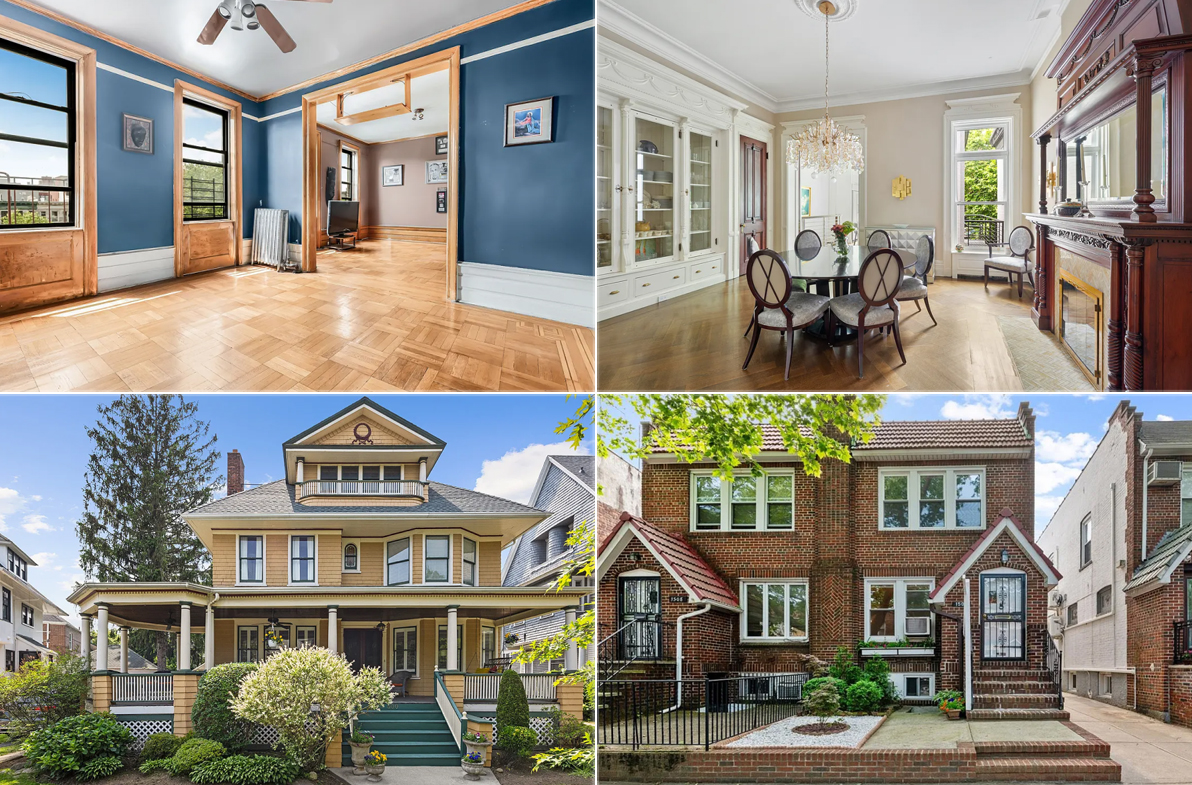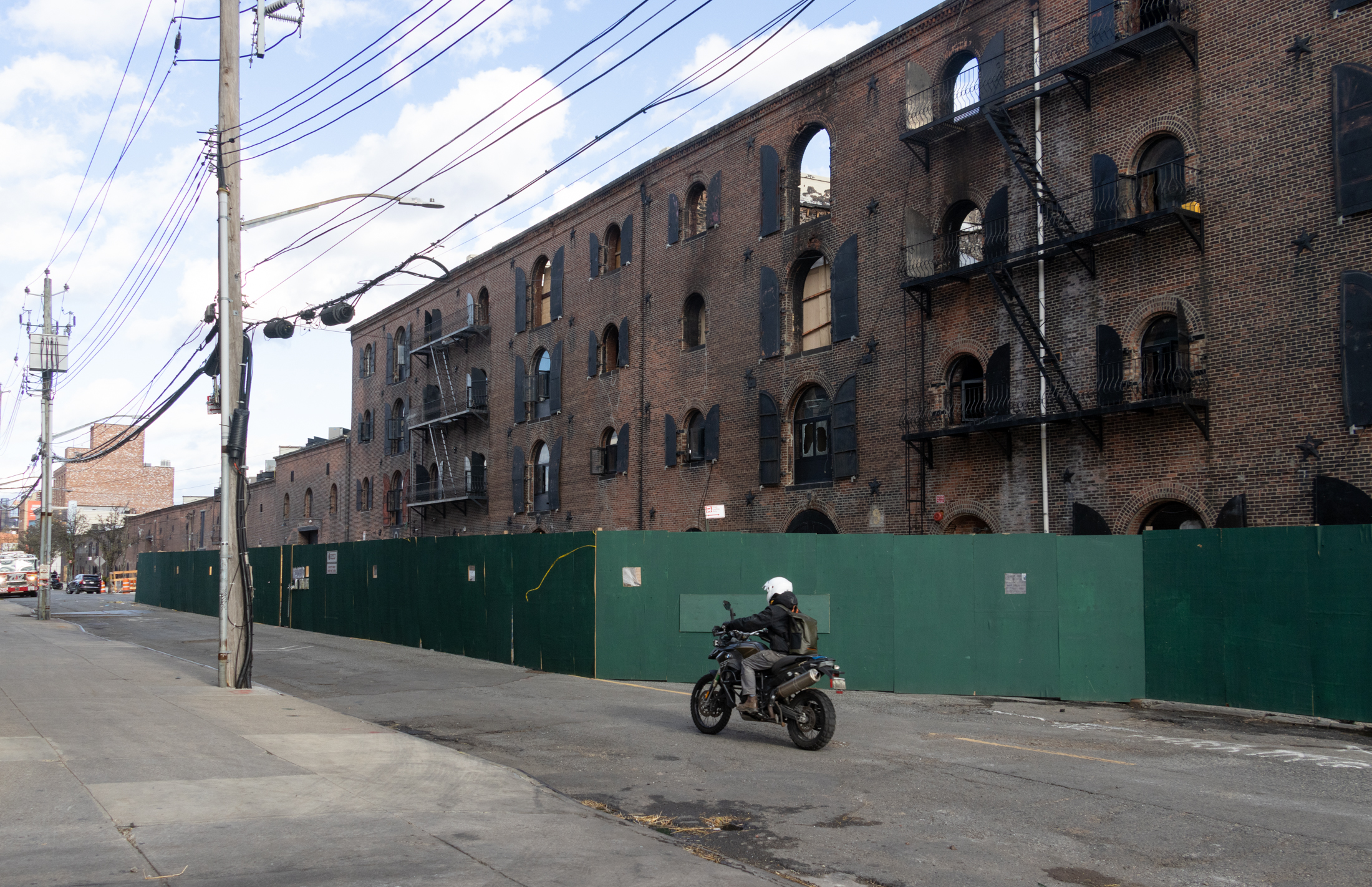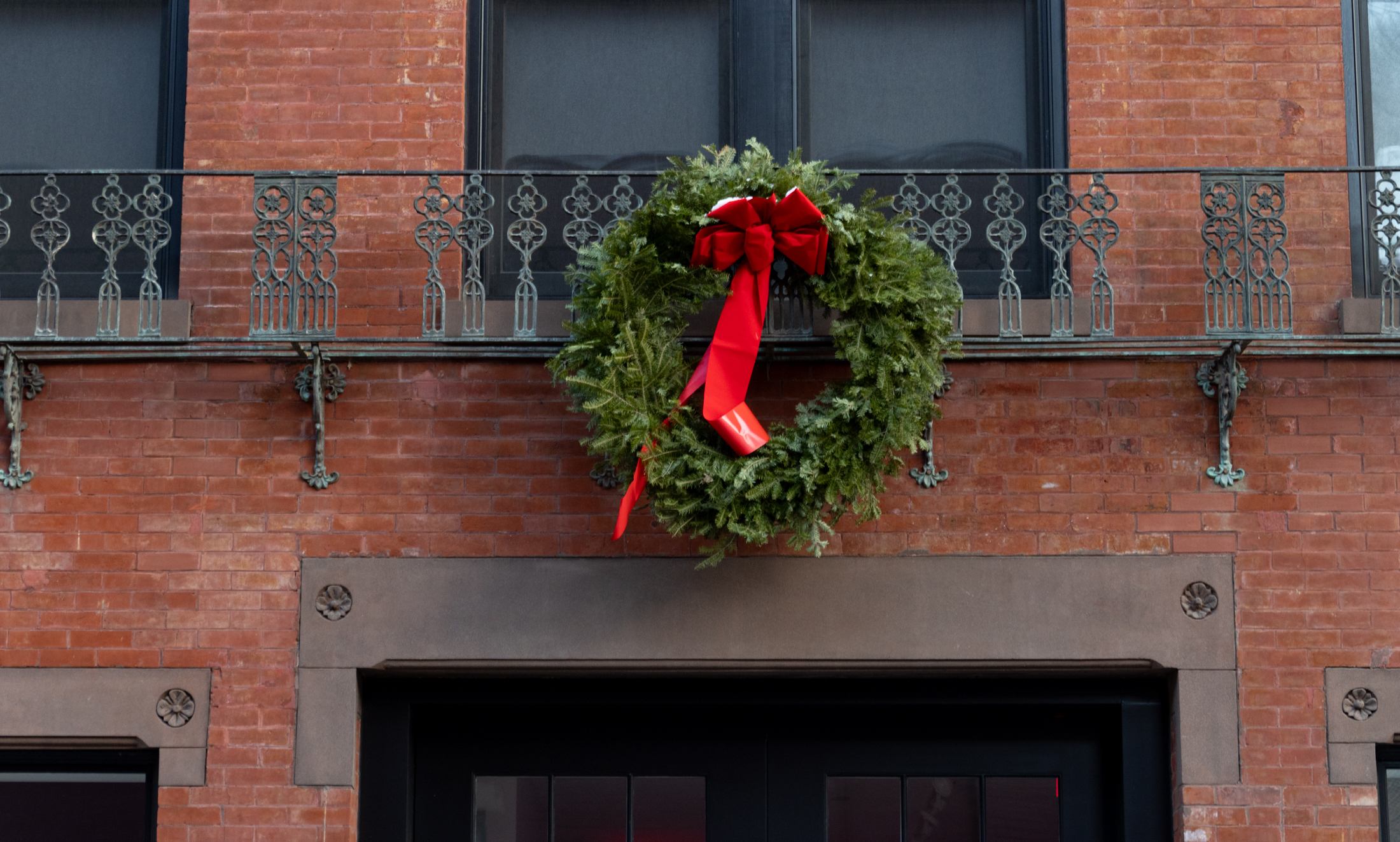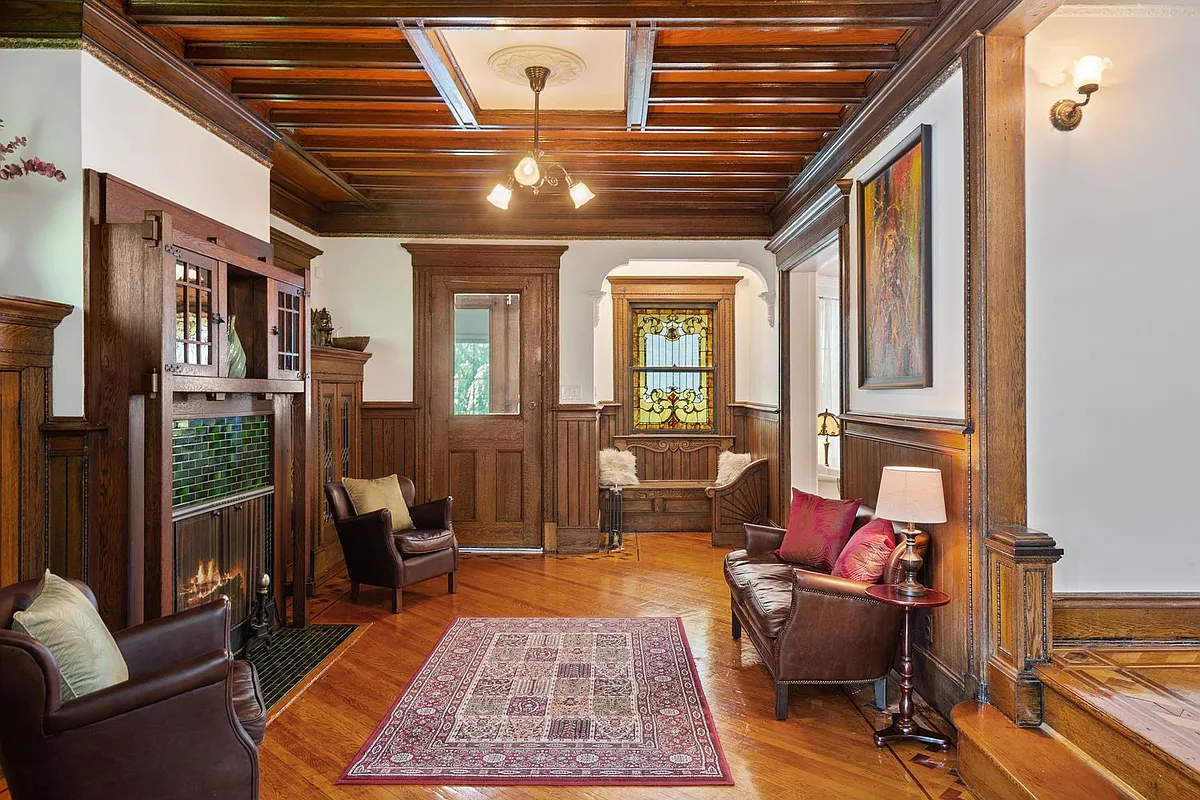Another Church on Fulton (As If It Needs One)
Fulton Street already has its fair share of churches, though many of them are of the storefront variety. Now just feet from one of the highest traffic prostitution corners in Brownstone Brooklyn, the Universal Church is erecting this large new home. (Check out the excavation underway on the jump.) Frankly, we can’t see why the…
Fulton Street already has its fair share of churches, though many of them are of the storefront variety. Now just feet from one of the highest traffic prostitution corners in Brownstone Brooklyn, the Universal Church is erecting this large new home. (Check out the excavation underway on the jump.) Frankly, we can’t see why the area needs a new church when beautiful old churches like St. Bartholomew are having such a difficult time remaining solvent. GMAP





No Anon 2:19. Unfortunately, those statistics are dead on. I work with inner-city kids through a Brooklyn based grass roots organization and we cite these statistics routinely in our presentation to at risk children in an effort to persuade them to seek a different path. IMHO you do the black community a major disservice by attempting to conceal the truth. I agree with the above poster and Juan Williams. The black community is indeed being destroyed by a “culture of failure” and attempts like yours and Shawana to paint an inaccurate rosy picture of a very serious social issue is part of the problem.
Believe it or not BECR’s stats are made up or incorrect. I believe the poster that disputed them isn’t wrong form correcting him/her. Part of what plagues black society are people manipulating numbers to demonize the classes that economically aren’t doing that well. Racist? Yes. The stats just aren’t true. I too would like to see where they come from. At least the poster that corrected BECR listed where they got their numbers from.
A Culture of Failure Taints Black America
By Juan Williams
Washington Post
Monday, August 21, 2006; Page A15
Have we taken our eyes off the prize? The civil rights movement continues, but the struggle today is not so much in the streets as in the home — and with our children. If systemic racism remains a reality, there is also a far more sinister obstacle facing African American young people today: a culture steeped in bitterness and nihilism, a culture that is a virtual blueprint for failure.
The emphasis on young people in today’s civil rights struggle is rooted in demographics. America’s black, Hispanic and immigrant population is far younger than its white population. Those young people of color live in the big cities and rely on big-city public schools.
With 50 percent of Hispanic children and nearly 70 percent of black children born to single women today these young people too often come from fractured families where there is little time for parenting. Their search for identity and a sense of direction is undermined by a twisted popular culture that focuses on the “bling-bling” of fast money associated with famous basketball players, rap artists, drug dealers and the idea that women are at their best when flaunting their sexuality and having babies.
In Washington, where a crime wave is tied to these troubled young souls, the city reacts with a curfew. It is a band-aid. The real question is how one does battle with the culture of failure that is poisoning young people — and do so without incurring the wrath of critics who say we are closing our eyes to existing racial injustice and are “blaming the victim.”
Recently Bill Cosby has once again run up against these critics. In 2004, on the 50th anniversary of the Brown v. Board of Education decision, Cosby took on that culture of failure in a speech that was a true successor to W.E.B. DuBois’s 1903 declaration that breaking the color line of segregation would be the main historical challenge for 20th-century America. In a nation where it is getting tougher and tougher to afford a house, health insurance and a college education — in other words, to attain solid middle-class status — Cosby decried the excuses for opting out of the competition altogether.
Cosby said that the quarter of black Americans still living in poverty are failing to hold up their end of a deal with history when they don’t take advantage of the opportunities created by the Supreme Court’s Brown decision and the sacrifices of civil rights leaders from Martin Luther King Jr. to Thurgood Marshall and Malcolm X. Those leaders in the 1950s and ’60s opened doors by winning passage of the Civil Rights Act, the Voting Rights Act and fair housing laws. Their triumphs led to the nationwide rise in black political power on school boards and in city halls and Congress.
Taken as a whole, that era of stunning breakthroughs set the stage for black people, disproportionately poor and ill-educated because of a history of slavery and segregation, to reach new heights — freed from the weight of government-sanctioned segregation. It also created a national model of social activism to advance the rights of women, Hispanics, gays and others.
Cosby asked the chilling question: “What good is Brown ” and all the victories of the civil rights era if nobody wants them? A generation after those major civil rights victories, black America is experiencing alarming dropout rates, shocking numbers of children born to single mothers and a frightening acceptance of criminal behavior that has too many black people filling up the jails. Where is the focus on taking advantage of new opportunities to advance and to close the racial gap in educational and economic achievement?
Incredibly, Cosby’s critics don’t see the desperate need to pull a generational fire alarm to warn people about a culture of failure that is sabotaging any chance for black people in poverty to move up and help their children reach the security of economic and educational achievement. Not one mainstream civil rights group picked up on his call for marches and protests against bad parenting, drug dealers, hate-filled rap music and failing schools.
Where is the civil rights groundswell on behalf of stronger marriages that will allow more children to grow up in two-parent families and have a better chance of staying out of poverty? Where are the marches demanding good schools for those children — and the strong cultural reinforcement for high academic achievement (instead of the charge that minority students who get good grades are “acting white”)? Where are the exhortations for children to reject the self-defeating stereotypes that reduce black people to violent, oversexed “gangstas,” minstrel show comedians and mindless athletes?
In order to face this century’s class battles, young minds need the self-confidence that comes from examples of inspiring historical personalities, such as a black woman born into slavery who made herself a national leader, Sojourner Truth, or a black man living under rank segregation, A. Philip Randolph, who defied corporate power to break segregation in organized labor. Frederick Douglass had to teach himself how to read before standing up to defeat slavery.
These examples should empower young people to believe in themselves and to organize across racial lines and build institutions with a solid footing in the nation’s political and economic power. This is real black culture, and it is based on strong families creating determined, self-reliant young people.
The defining challenge for this generation of Americans dealing with poverty is putting the next generation in a position to move even higher. Individuals must now use the opportunities made available to them by the sacrifices of past generations if they are to achieve victory in America’s long and still unfinished civil rights movement.
Juan Williams is a senior correspondent for National Public Radio, a political analyst for Fox News and author of “Eyes on the Prize: America’s Civil Rights Years, 1954-1965.”
ENOUGH, By Juan Williams – Book Description
Half a century after brave Americans took to the streets to raise the bar of opportunity for all races, Juan Williams writes that too many black Americans are in crisis—caught in a twisted hip-hop culture, dropping out of school, ending up in jail, having babies when they are not ready to be parents, and falling to the bottom in twenty-first-century global economic competition.
In Enough, Juan Williams issues a lucid, impassioned clarion call to do the right thing now, before we travel so far off the glorious path set by generations of civil rights heroes that there can be no more reaching back to offer a hand and rescue those being left behind.
Inspired by Bill Cosby’s now famous speech at the NAACP gala celebrating the fiftieth anniversary of the Brown decision integrating schools, Williams makes the case that while there is still racism, it is way past time for black Americans to open their eyes to the “culture of failure†that exists within their community. He raises the banner of proud black traditional values—self-help, strong families, and belief in God—that sustained black people through generations of oppression and flowered in the exhilarating promise of the modern civil rights movement. Williams asks what happened to keeping our eyes on the prize by proving the case for equality with black excellence and achievement.
He takes particular aim at prominent black leaders—from Al Sharpton to Jesse Jackson to Marion Barry. Williams exposes the call for reparations as an act of futility, a detour into self-pity; he condemns the “Stop Snitching†campaign as nothing more than a surrender to criminals; and he decries the glorification of materialism, misogyny, and murder as a corruption of a rich black culture, a tragic turn into pornographic excess that is hurting young black minds, especially among the poor.
Reinforcing his incisive observations with solid research and alarming statistical data, Williams offers a concrete plan for overcoming the obstacles that now stand in the way of African Americans’ full participation in the nation’s freedom and prosperity. Certain to be widely discussed and vehemently debated, Enough is a bold, perceptive, solution-based look at African American life, culture, and politics today.
Anon 9:16am, First, I believe the poster used BECR as a joke to highlight the absurdity of Shawana’s declaration in her initial post. The author made no such claim of being “exceptional” or “special” because he or she is educated. Please learn to read and stop projecting. Second, despite obvious ‘typos” BECR raised some excellent points and you should get your head out of your butt and smell the coffee. Blacks are not being oppressed by the system or the man. This is simply not true. Go read “Enough” by Juan Williams and you will find all the statistics you want on what’s “really” destroying the black community. Educate yourself before ranting off sheer illogical defensive stupidity. You make us look like a bunch of scapegoating liberal idiots and perpetual victims.
Yes, all of the blacks I know are well educated and professionally oriented but they, like yourself, are not the majority. As is the case with the majority of people in the black community, you’re in denial. I too hate it that our community is plagued by such negative statistics but I’m not going to make excuses for our shortcomings and failures or try to rationalize away their significance.
This exchange is quite interesting. Misused statistics can be very dangerous, BECR. I’m not doubting all of your numbers, but you provide them with insufficient context.
Shawna is right… we need to respect the culture of the community we live in. Its not the racecard, its reality. We should be thankful this building is not a night club… just people trying to do good. There are “bad apples” in every bunch- organized religion, government, education, etc; however, these “bad apples” do not negate the good that these institutions do.
I knew from the get go that this would turn into a discussion about race. I take issue with your numbers BECR. Where did you get your information from. If you’re trying to “educate” us about what a plight on society black people are maybe you should tell us where is the source of your info so we can all check it out. I have no problem believing you if it’s true but virtually all the black people I’ve known are single or married, are college educated professionals and virtually none of them had kids out of wedlock. If you are indeed black and educated as you say, then get off your high horse. You’re not the only black person living in Bklyn that is educated and you know that. If you are so educated, why would you tolerate living in your neighborhood amongst the lowest common denominator of our society. You’ve insulted every black person on here and in your neighborhood period. You mean to tell me that you’re an oddity in Clinton Hill being black and educated? That I’m supposed to believe that you’re not one of the four black people who have been incarcerated? See what I’m saying? If you’re so educated…why are you so dumb?
Here’s the deal on your numbers:
1) 25% of black families are dual income? It’s no mystery that black people can’t get jobs, maybe some folks that get thrown into that number don’t need 2 incomes to make it work. Maybe they’re actually well off? I’m not saying that that’s the case but the small number that are affect that number. Maybe there’s a husband or wife in grad school?
2)More black men between the ages of 18 and 22 in jail than in college? Are there more white people in jail period? Are they in jail because they committed crimes or because they don’t know their rights and have access to good lawyers….like some people we know. Sure the system is completely accurate and true and virtuous…..WRONG!!! Plus who makes that statistic? Dept of Education, Bureau of Justice….because I couldn’t find it.
3)1 out of 4 black men between the age of 18 and 35 is confined to the penal system, whether they’re incarcerated, waiting trail, on probation or on parole? A)It’s “trial” not trail. B) Again very easy when the police believe that black people are all criminals and will readily arrest a black person before they arrest a white person. The attitude is, well..he’s black so lets arrest him..he’s guilty of something. Hence the fact that if you take away the amount of black men falsely arrested this number would change significantly.
4)75% of all black children are born to unwed mothers? Where did this number come from? Is it based on your neighborhood? Brooklyn? NY? USA? Does this include Africa, West Indies, etc. You said “all black children”. Show me your source on that one because it’s far from true.
5)the unemployment rate for black males in NYC is 60%? I see the unemployment rate for black/african americans as around 8.6% at it’s highest (that’s independent of age..if you look at ages 16-19 for the race then it balloons up to a whopping 26.8%…compare this to 13.5% for white kids (and I say who cares if teenagers are working or not). With your number of 60% and such a large concentration of Black men in NYC it would be hard to get that number down to 8.6% (By the way, those number are from the Bureau of Labor Statistics)
6)only 40% of all black high school students graduate on time? I actually started early and finished on time without needing to take any math in college…and I was an accounting major. Do we really care if “they” are finishing on time? Are they finishing at a higher rate then they used to?
7) blacks make up only 10% of the US pop. size yet comprise 38% of the US. jail pop….etc…? From 1986-1997 whites have outnumbered blacks in jail to the tune of 2 million to 1.1 million (in 86) and 3.4 million to 2.15 million (in 97)…but that’s just from the Dept of Justice, Bureau of Justice Statistics…By the way the Black population in 1997 was about 37 million (that 12.8% of the population). Those numbers are from the census bureau. I think it’s probably more important to point out that while Black people represent a lower percentage of the overall population and a higher number of the jail population we know this to be true because blacks (and other minorities) generally make less than whites and poverty can put you into legal problems that they can’t buy themselves out of AND there are still more white people in jail. So that must mean because there are more white convicted criminals than black that we should believe that ALL white people are criminals? Ummm…NOOO
“Back then 83% of all black households were comprised of duel parent families.” That’s you. The educated person.
If you’re so educated how come you used the incorrect version of the word “duel”…it should’ve been “dual” (as in both or two…not a gun fight. Or maybe you did mean that).
Look, check your facts and educate yourself on the numbers so you’re not spouting some other racist views by repeating this propaganda. If you can prove you’re right then I can accept that but if you can’t prove anything then shut the hell up!!
Sorry I saw this thread so late (Fri AM) but Shawna you appall me. You “love” this peaceful neighborhood, you uphold the institutions of the church then you tell certain people who offend you to hawl their “white asses” over to Bay Ridge. May be you should “hawl your black ass” somewhere else.
You are a hypocrite. You do not do your beloved church going minority peers a service in the least. You are filled with hate, pure vile hate. Go’way. T’day. 🙂
You raise very good points “Black, Educated, Clinton Hill Resident.” I do not assert that the church is the savior of the black community. I couldn’t agree more about the state of crisis with respect to the black family and the fact that the black church has been under-concerned and under-involved. I am by no means a bible thumper or naive enough to think that simply praying to Jesus (or any other diety) will solve very deep and complex problems on a personal or societal level.
My point was less about defending the church as an institution and more about defending the rights of the residents of our (still primarily black) community to express themselves and worship in a way THEY see fit, in THEIR neighborhoods whether or not these Becky/Bob-come-latelies perceive the building as architecturally acceptable by their standards. (Mind you, this is the same board whose posters complain about tearing down a dilapidated brownstone that could have been potentially sold for 1mil+ to some pseudo-wealthy individual in order to provide affordable, mid-income housing for many).
Whether or not any of us personally agree with how others choose to worship or obtain the inspiration/ support they need to survive is immaterial. However, what we can not deny is that the church has historically, and continues to have, major significance in the black community. It irks me to hear such shallow dialogue about how churches happen to inconvenience new comers because of the noise and parking issues. Go somewhere else then dammit!…Save up and move to Park Slope, or better yet Manhattan. What about the lives churches save by offering a sense of hope, purpose, and recovery to those who attend? What about the political empowerment they have afforded by being a voice of the black community? Yes, there is hypocrisy and MUCH opportunity to improve, but it’s the closest thing to a collective voice and community of support that we’ve got!
In sum, I’m not making an all-good or all-bad argument, but to have no appreciation for the significance the church has to your neighbors and to trivialize their desire and right to build houses of worship that suit their needs is just plain ignorant. If you choose to call my expression “playing the race card,†so be it and I feel for you. If we are to co-exist in this wonderful community of Fort Greene/Clinton Hill/BedStuy, we need to respect each other and not turn our noses up at each other’s values and cultural practices because they are “inconvenient”.